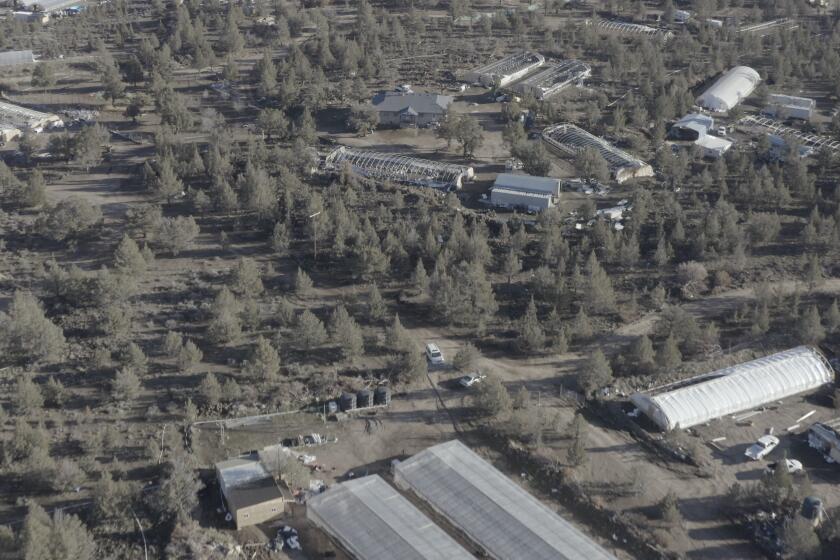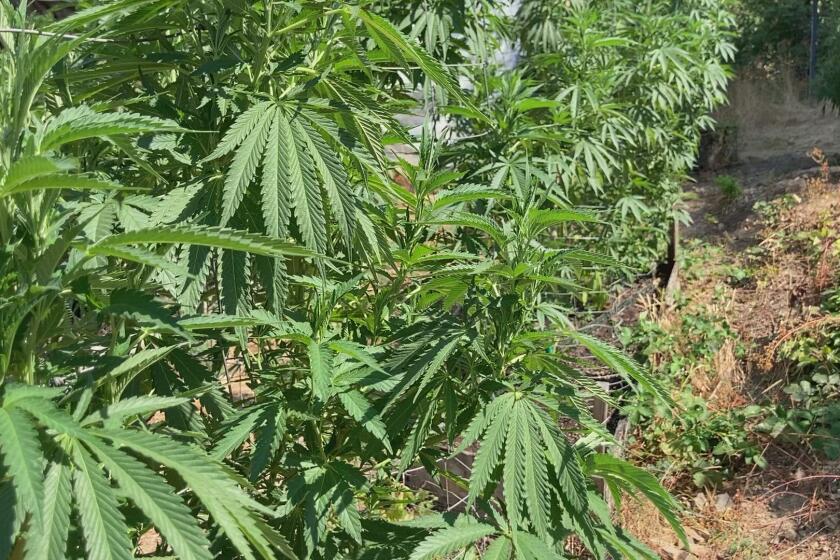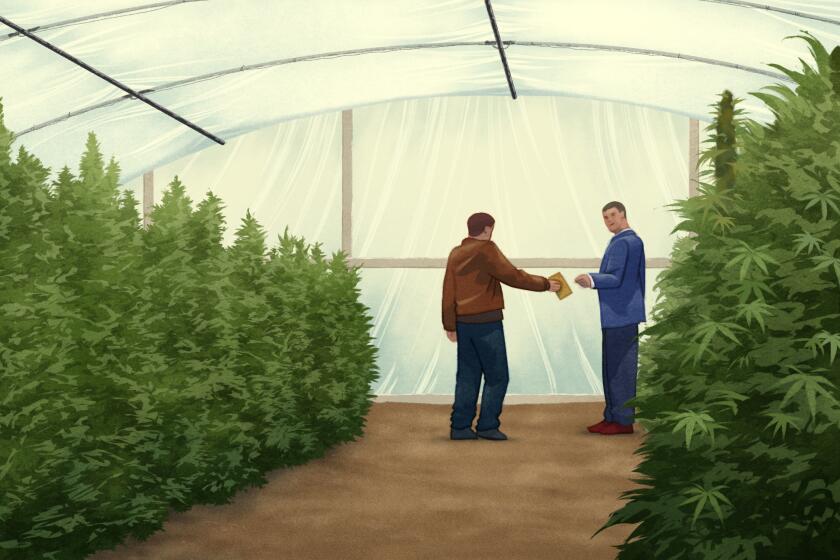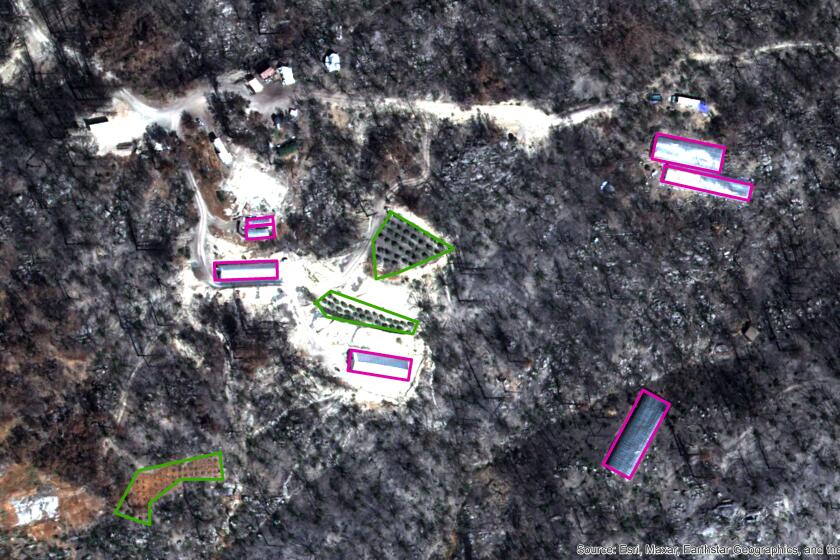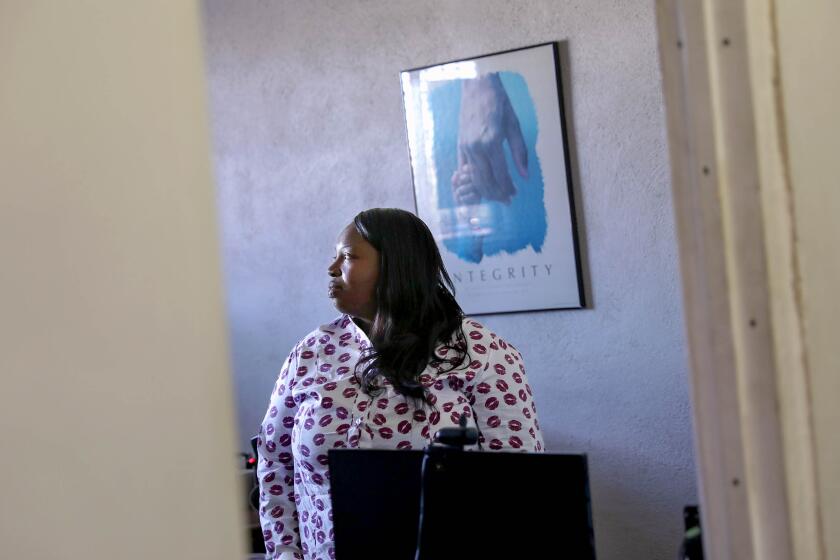Killings, robberies, extortion. California can’t stop its booming illegal cannabis stores
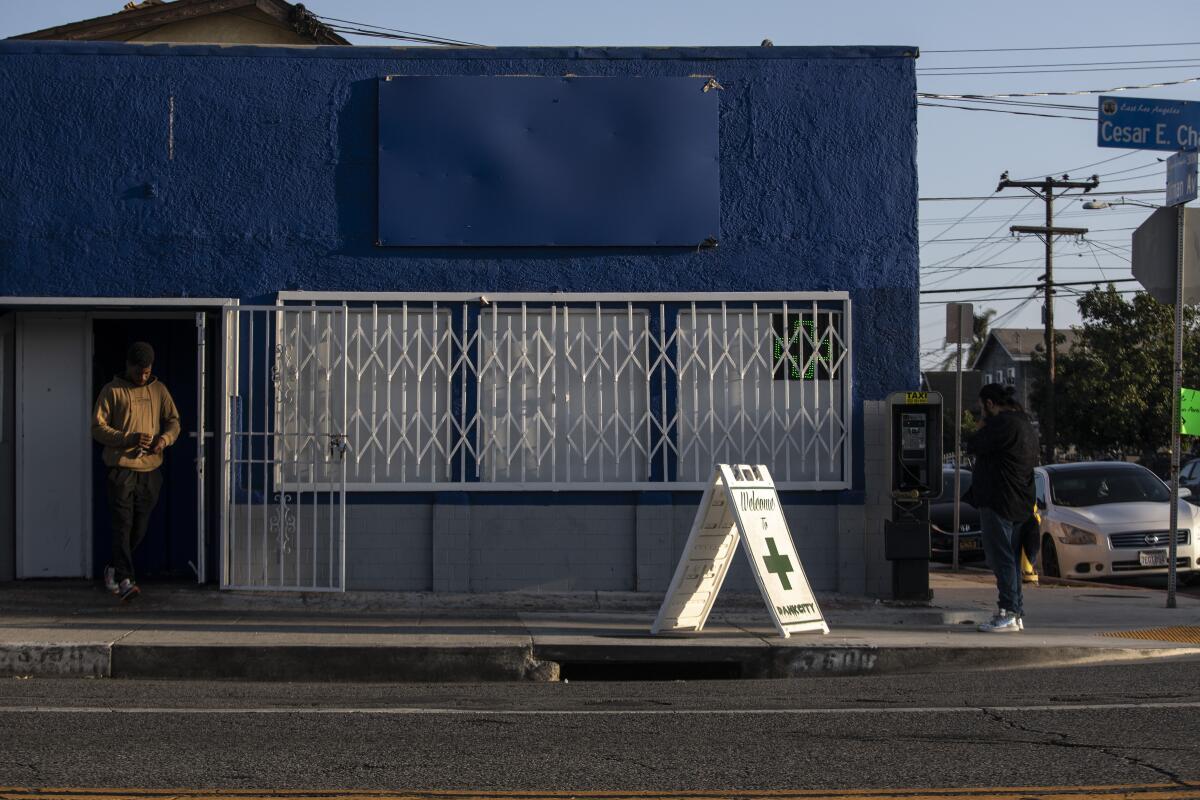
- Share via
When the cannabis dispensary Hierba opened on Cesar Chavez Avenue in October, customers had “sticker shock,” Guillermo Menjivar, the general manager, recalled.
Even with a 30% opening week discount, shoppers still couldn’t understand why, for instance, a gram of First Class Funk cost $15.
They could be forgiven: Until Hierba — the first legal dispensary in the city’s Boyle Heights neighborhood — opened its doors, the only options in the area were unlicensed storefronts that charge far less for cannabis products because they don’t abide by the raft of taxes and regulatory obligations that state and local officials impose on legitimate operations.
A mile east of Menjivar’s clean, brightly lit business, in fact, an unmarked and unlicensed shop had put a folding sign out on the sidewalk that read, “4.5 grams for $20.” Inside the dimly lit room was a bare-bones array of grimy mason jars piled high with bargain-priced buds.
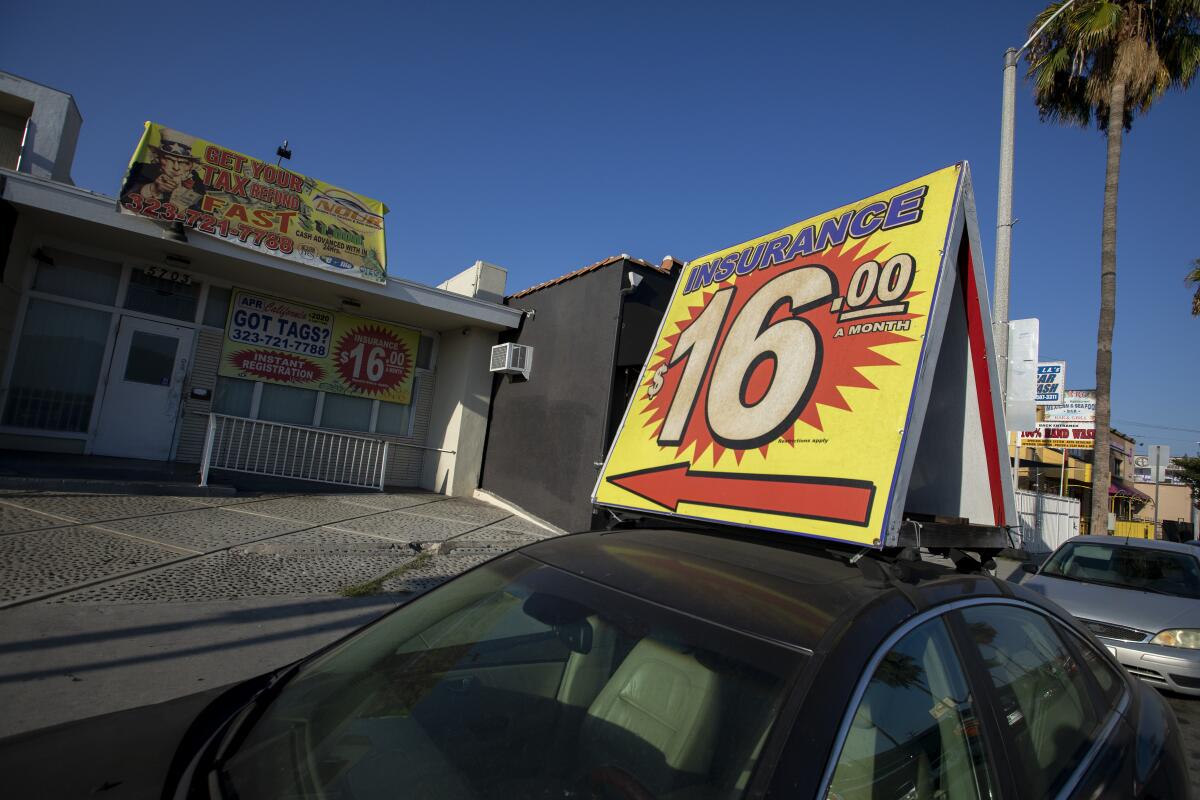
The continuing success of illegal cannabis shops and the struggles of legal ones in the heart of L.A.’s Eastside offer a stark illustration of how California’s legalization of marijuana has gone wrong. Far from being eradicated, the black market is booming in plain sight, luring customers away from aboveboard retailers with their cheaper — if untested and unregulated — product.
Unlicensed dispensaries have become hotbeds of crime. Sometimes the operators are the perpetrators, authorities say, selling cocaine and methamphetamine alongside cannabis. At other times, they are the victims. In August 2021, a man was gunned down in the doorway of the illegal dispensary he ran in East Los Angeles.
Authorities have made little progress in curbing the cannabis black market. Prosecutions are rare, according to court records, and shop employees say some dispensaries don’t even wait a day to reopen after being shut down by the police.
“I don’t see it slowing down,” said one security guard at an illegal dispensary that has been raided four times in the last year and a half. “Just look up and down the street. It’s everywhere. And everyone’s making money.”

In the battle over black-market and legal cannabis, Indiana Street is a dividing line. To its west is the city of Los Angeles, where local laws allow retail cannabis businesses to operate, provided the required licenses and permits are obtained.
On the other side of Indiana Street is East Los Angeles, unincorporated county land where cannabis licenses are not issued and it remains illegal for anyone to operate a dispensary.
Investigators for the L.A. County Sheriff’s Department say there are 25 to 30 illegal dispensaries operating in the East Los Angeles area — the most of any of the department’s patrol regions. In all, there are an estimated 150 to 160 illegal dispensaries in the department’s jurisdiction, which includes unincorporated county land and cities that contract with the sheriff, according to a sheriff’s narcotics investigator who asked to remain anonymous because he works undercover.
Most of East L.A.’s dispensaries are clustered along Whittier Boulevard. Long the commercial heart of the neighborhood, the boulevard is crowded with narrow storefronts offering money transfers, phone repairs and tailoring, pawnshops and medical clinics, shoe stores and immigration law practices. Racks of discounted clothing compete for sidewalk space with women selling aguas frescas and chopped fruit.
California’s legalization of recreational cannabis in 2016 ushered in a multibillion-dollar industry estimated to be the largest legal weed market in the world. But many of the promises of legalization have proved elusive. In a series of occasional stories, we’ll explore the fallout of legal pot in California.
Some of the dozen or so illegal dispensaries operating on any given day along the boulevard advertise openly, with signage on the property and Yelp pages. Others are more discreet, changing their names or forgoing names altogether. One shop covered its windows with signage from the car insurance agency next door.
When undercover detectives asked employees in the shop’s lobby if they sold insurance, they laughed and said no, according to a search warrant application. Detectives served the warrant last September, seizing cannabis, cash from the register and a safe, two handguns, a rifle, a drum ammunition magazine and bags of what authorities suspected was cocaine, court records show.
A Times reporter visited the dispensary two months after the raid. Through the first door was a gloomy lobby with couches pushed up against the walls, a vending machine in a corner and a door at the back with a sign that read, “We’re open.” Through that door, then another one, was a small room lined with glass display cases. Inside were jars full of cannabis priced from $8 to $10 a gram.
The sole employee said he was just a clerk and couldn’t say who managed the dispensary. A request for comment left with the clerk wasn’t returned.
Illegal cannabis farms are engulfing parts of California and exploiting farmworkers who labor in squalid, deadly conditions, a Times investigation finds.
Dozens of affidavits filed at the East Los Angeles courthouse to obtain search warrants make clear that for most dispensaries along Whittier Boulevard, being raided by the police is no deterrent. One shop on Whittier Boulevard has been searched by the Sheriff’s Department four times in the last year and a half, most recently in February, when detectives carried off its inventory and $819 in cash.
The dispensary’s security guard described a recent raid to a Times reporter. Deputies broke down the door, seized all the product and money, and cited him and several other employees. With a court date approaching, the guard said he didn’t plan to show up and predicted the authorities wouldn’t pursue the case.
We realize this is not a law-enforcement-specific issue anymore. We’re not going to arrest our way out of unlicensed cannabis sales.
— Vito Ceccia, a detective supervisor for the LAPD
The security guard, who declined to give his name, said he had worked at a Marshalls department store before getting the job at the dispensary. He said he didn’t know who owns the shop, the source of the cannabis it sells or how much money it makes. He and other employees were “just trying to make our bread,” he said.
“People come in and they’re appreciative because it’s a lot cheaper than if they went somewhere legal,” the guard said, noting that the price they see is the price they pay — no taxes added.
Down Whittier Boulevard, a dispensary called Whittier’s Best Buds has been raided five times in the last year, search warrants show.
Investigators seeking a judge’s permission to search an unlicensed dispensary and carry off evidence — cannabis, digital video recorders, cash, paperwork that might indicate its ownership structure — have a low bar to clear, search warrant records show. It is often as simple as noting people entering a storefront empty-handed and leaving with small white bags, walking into a shop in plainclothes and asking an employee about marijuana prices, or citing a dispensary’s Yelp page.
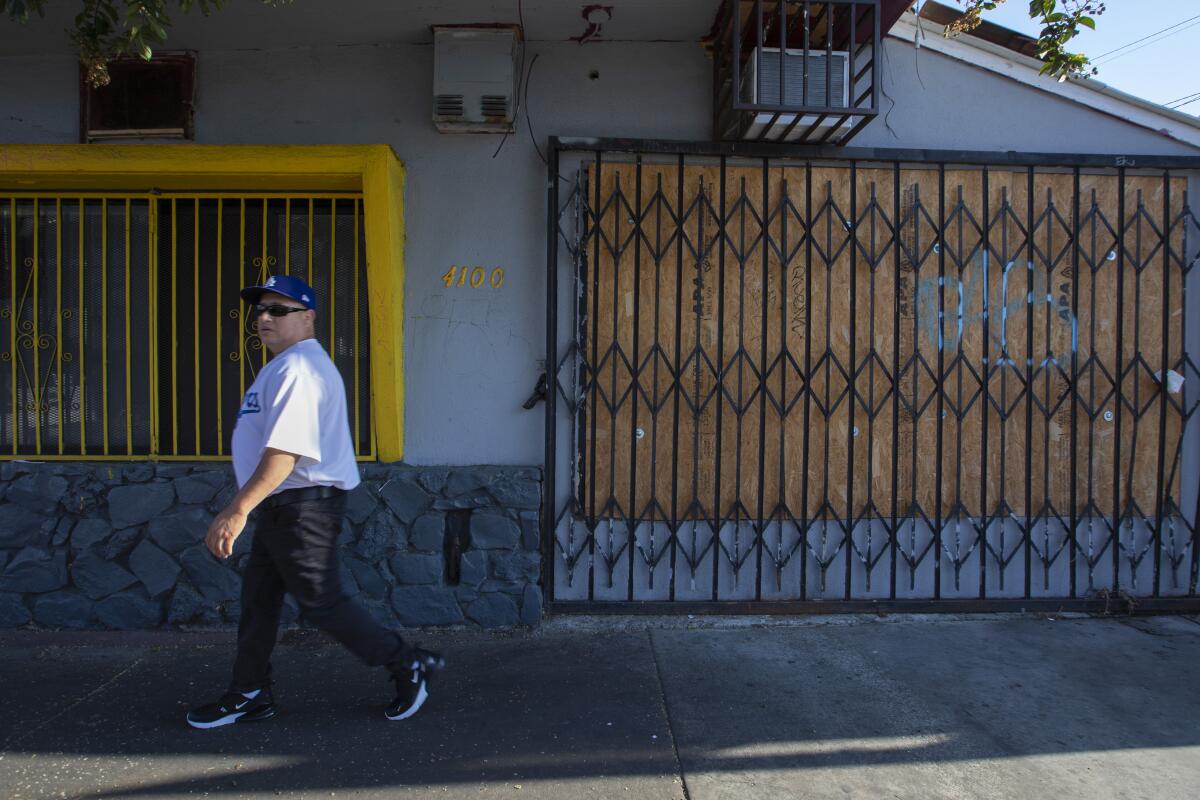
Detectives can also apply for a court order to shut off the business’ power for 90 days, although, as a deputy wrote in seeking yet another warrant to search Whittier’s Best Buds, operators “find creative ways to power the business.” When the shop was raided in February, detectives carried off a Predator 3500 generator along with cannabis and $4,159 in cash.
Sandwiched between a cellphone store and a shop selling women’s clothing, the dispensary offers grams of “top shelf” marijuana for as little as $8, according to a menu taped above a security window. In the dispensary’s lobby, which was painted with a large, colorful cartoon character inhaling from a bong, a man who identified himself as the owner complained to a Times reporter about the Sheriff’s Department’s raids, which he described as “legal robbery.”
Wearing a baseball cap that read “F— Joe Biden,” he said his initial goal was to obtain a license and the necessary permits to run an above-board business in an area of the county that allows it. “Lots of people want to get licensed, but the government doesn’t want to give it to them,” he said.
“Tax, permit, license,” he said, ticking off the things for which a legal operator has to pay. “We’re going to take your money. Without [the] license, we’re going to f— you up with raids. Either way, you’re going to lose.”
The raids have not made him consider shutting down, he said. “Why am I going to close shop? People are crying for this stuff, crying for weed.”
Many of the people arrested on suspicion of operating or working at illegal dispensaries in unincorporated parts of the county are not prosecuted. Those who are typically don’t face cannabis offenses, but weapons charges after being caught with guns, according to a review of court records. Even then, some defendants were allowed to enter diversion programs and have their charges dismissed.
One man was arrested at Whittier’s Best Buds on suspicion of maintaining a place to sell controlled substances, a felony, and was found to be carrying a handgun, records show. Charged five months later with a misdemeanor crime of possessing a concealed gun, the man avoided prosecution by entering a diversion program. After he showed he’d taken a gun safety class and registered the weapon, the judge ordered the Sheriff’s Department to return $600 in cash and the newly registered Glock 19 handgun they’d seized from him, records show.
California’s legalization of recreational cannabis in 2016 ushered in a multibillion-dollar industry. But many of the promises of legalization have proved elusive.
Greg Risling, a spokesman for the Los Angeles County district attorney’s office, said prosecutors charge people with crimes associated with operating illegal dispensaries “when the evidence has been sufficient to prove.” The typical charge, Risling said, is a violation of the county prohibition on cannabis dispensaries, a misdemeanor.
Lt. Howard Fuchs of the Sheriff’s Department’s Narcotics Bureau disputed this. “The district attorney will not file these cases whatsoever,” he said. “Even if it’s near a school, they’ve told us they will not file these cases.”
The lieutenant said prosecuting people who operate or work at illegal dispensaries — and securing meaningful penalties — would be the most effective way to shut them down. Other strategies, like obtaining court orders to cut off a dispensary’s utilities, are easily circumvented, he said, while civil actions pursued by county lawyers to evict or lock out illegal operators are time-consuming and difficult to carry out in a meaningful way given the scale of the problem.
When it comes to charging people for crimes related to illegal dispensaries, “there’s this attitude: It’s just cannabis, we’re not going to incarcerate people for that,” Fuchs said. “Well, you’re just telling the legal market, ‘Good luck.’”
Illegal dispensaries, meanwhile, are making money “hand over fist,” Fuchs said. His detectives have seized cash and ledgers documenting sales that indicate the busier ones are making as much as $25,000 a day in revenue, he said.
An illegal dispensary can cost just a few thousand dollars to open, investigators say: rent, product, some display cases, a surveillance system, wages for a few employees.
Commercial cannabis resulted in corruption and questionable conduct that has rocked local governments across California, a Times investigation found.
Compare this to Menjivar’s dispensary, Hierba. The shop’s backers have invested several million dollars and worked for nearly three years to open it, he said. Driving up the start-up cost, he said, are delays in the application process: state regulators certified the dispensary in April 2021, but city authorities did not allow it to open until October.
For some applicants, the process has taken as long as 18 months, Menjivar said. All the while they must keep paying rent. “You’re literally at their mercy,” he said.
Legal operators must also abide by local regulations that dictate where dispensaries can operate, so called “green zones” away from schools and playgrounds. This restricts the real estate available to a scrupulous dispensary operator.
All of this contributes to the price that consumers pay, Menjivar said. Certification that the product has been tested for toxins, excise taxes on wholesale purchases, sales taxes levied by state and local authorities — “it costs more to do it the right way,” he said.
Vito Ceccia, a detective supervisor who oversees enforcement of unlicensed cannabis shops for the LAPD, said police work alone won’t be enough to ensure legal dispensaries survive. Local officials will need to educate the public about the benefits of patronizing licensed shops and stress the quality control that goes into their products.
“We realize this is not a law-enforcement-specific issue anymore,” he said. “We’re not going to arrest our way out of unlicensed cannabis sales.”

The evening of Aug. 11, 2021, Daniel Franco was standing outside the illegal dispensary that he operated on Whittier Boulevard when a barrage of gunshots were fired from across the street.
As Franco tried to retreat inside, a bullet went through his head. He died on the floor of the shop, six feet from his revolver, which was resting on a table, according to a coroner’s report. A coroner’s investigator noted bullet holes in the walls and “large amounts” of cannabis heaped in plastic trays in the room where Franco died.
Twelve shell casings fired from an assault rifle were found across the street. Eight more casings lay near the doorway of the dispensary, indicating that the shooter had chased after Franco, the investigator wrote.
His death is one example of the violence that plagues illegal dispensaries, whose owners, employees and customers are vulnerable to being robbed, swindled or killed, authorities say. Nonfatal crimes are rarely reported for fear of drawing scrutiny from the police.
It’s unclear why Franco was targeted; the sheriff’s detective investigating his death, Scott Giles, declined to discuss the case. “We don’t want the public or the people responsible to know what we know,” he said. No arrests have been made.
In a search warrant served in connection with the shooting, sheriff’s investigators said they believed Franco’s shop may have been associated with another illegal dispensary. A week after the killing, someone called the Sheriff’s Department to report seeing two men, one carrying an AR-15-style assault rifle, enter a store on Cesar Chavez Avenue a mile and a half northwest of Franco’s shop, a detective wrote in an affidavit used to obtain the warrant.
A Times analysis of satellite imagery suggests California’s efforts to encourage cannabis growers into the legal market are foundering.
When deputies responded to the call and entered the store, they discovered it was a dispensary. Cannabis, hashish, honey oil and, in a corner, an AR-15 were in plain view, according to the warrant. Three men and a woman were detained, and detectives carried off the rifle, the cannabis products and $971 in cash.
Deputies had raided the shop — a blue stucco building with an iron security door and no signage — three times in the last four months. Detectives believed the dispensary was “related” to Franco’s shop “because the same employees have been arrested at both locations on multiple occasions,” the warrant says.
One of the men detained that day, Israel Zuniga, has been charged with possessing a concealed gun in a public place, records show. He was arrested at the same dispensary three months later and charged with maintaining a place for the purposes of selling marijuana. In March, he was arrested a third time at the shop and now faces a second charge of possessing a concealed firearm, records show. Zuniga, 23, has pleaded not guilty to the charges — all misdemeanors — and remains free, pending the resolution of his cases. He has not been charged in connection to Franco’s killing.
The dispensary on Cesar Chavez Avenue where Zuniga was detained remains open. In its reception area, a Times reporter asked the clerk to speak with the shop’s proprietor. “Hold on,” he said, and disappeared through a door in the back of the store. He returned about a minute later and said he would have to “kindly decline” due to “privacy reasons.”
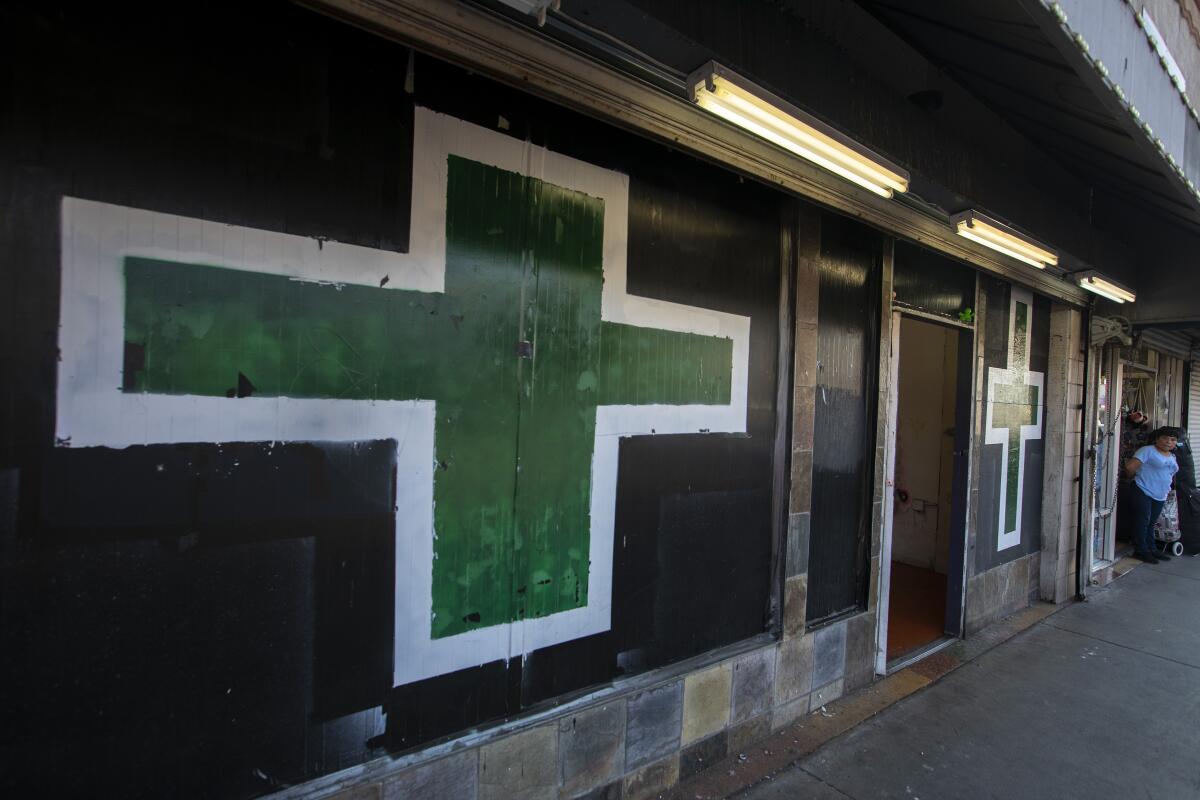
Most of the illegal dispensaries in East Los Angeles are being “taxed” by gangs, said the undercover sheriff’s investigator. The more sophisticated gangs demand money, while the cruder ones are content with free product, the investigator said.
“They know they’re both doing illicit activity, and no one’s going to say anything,” he said.
Two of the area’s largest gangs, Varrio Nuevo Estrada and East L.A.-13, have opened dispensaries of their own, according to the investigator, staffing them with gang members and selling not just marijuana but methamphetamine, heroin and guns.
“They saw it was not complicated at all to run a cannabis storefront,” he said.
One security guard who works at several illegal dispensaries said gang members had been trying to tax the owners of a shop where he worked on Whittier Boulevard. The guard, a 26-year-old Compton resident who earns $15 an hour to stand guard with an unregistered handgun, asked not to be identified because he is involved in illegal activity.
The promise of ‘social equity’ has been a key narrative tied to California’s legalized pot industry. So far, efforts have been mired by costly delays.
Around 9 one night last September, he noticed several men standing outside the dispensary. It seemed like they were casing the shop, he said, so he walked outside and hid his gun in his car: If he was about to get robbed, he thought he’d rather not have it on him.
Eight men walked into the dispensary. One pointed a gun at him and told him to lay down and put his hands behind his head, he recalled. They took his phone and his keys. He heard the screams of the women who worked as bud tenders, he said, and he thought they were all about to die.
The men took “everything we had,” he said, including the shop’s product, money from the register, and money and personal property from him and other employees.
He believed the men who robbed the dispensary were from the same gang that had been trying to tax it. As far as he knew, he said, the owners never reported the robbery or the extortion.
“What are the shops going to do?” he asked. “Call the cops, when it’s illegal?”
More to Read
Credits
Editor: Joel Rubin
Photographer: Brian van der Brug
Photo Editing: Keith Bedford
Copy Editing: Jim Buzinski
Page Design: Keith Bedford
Audience Engagement: Mary Kate Metivier
Sign up for Essential California
The most important California stories and recommendations in your inbox every morning.
You may occasionally receive promotional content from the Los Angeles Times.

